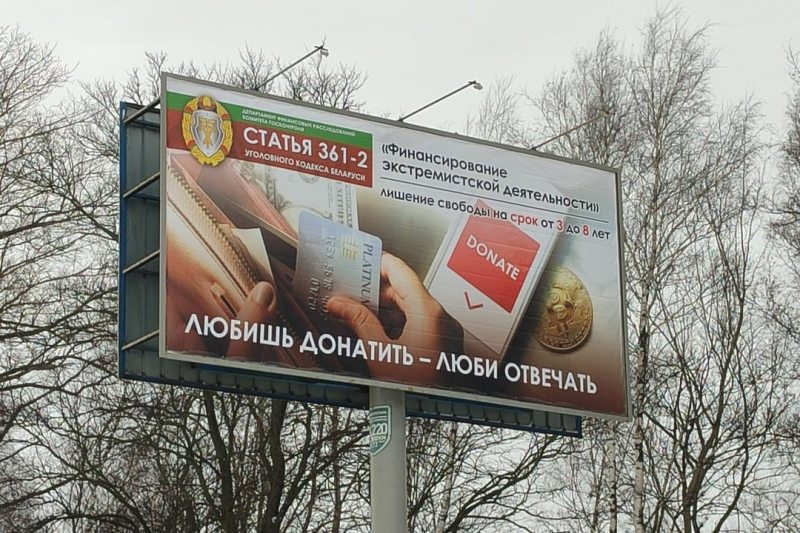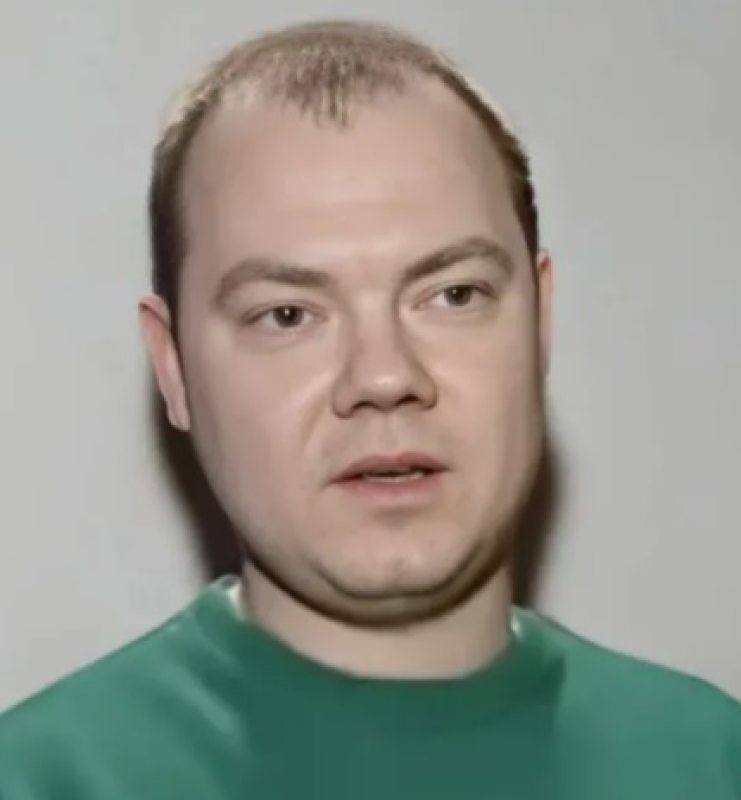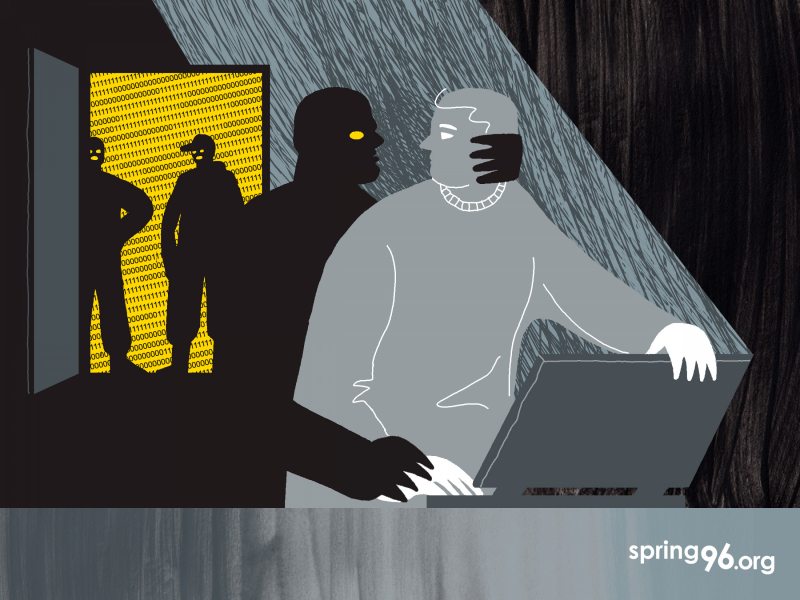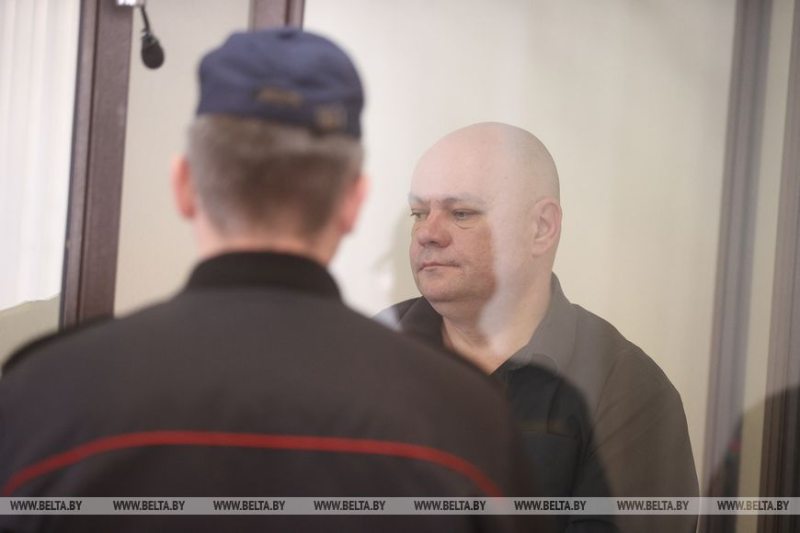77 people were convicted for donations. How are they persecuted in Belarus for solidarity, and how to avoid persecution for it Updated
On January 13, it became known about the terrible consequences of persecution for showing solidarity. Political prisoner Vadzim Khrasko sentenced to three years for donations died in the colony; he had a serious illness.
In 2020, a strong wave of solidarity emerged in response to violence by the security forces. Belarusians have started actively donating to many funds to help victims of persecution. Some of the people who donated in 2020 are called to the KGB and demanded in a out-of-court manner to donate amounts many times more than initial donations, threatening to open a criminal case. As reported by the Ministry of Internal Affairs, only since the beginning of 2024, 260 people have made "voluntary donations" in the amount of more than 356 thousand dollars. Some are immediately detained as part of a criminal case for "financing extremist activities" (Articles 361-2 of the Criminal Code). For donations to organizations which are recognized as "extremist formations", one can be sentenced to up to five years in prison. Even if the donation was made at a time when the organization was not recognized as such. Also there is active persecution under Article 290-1 of the Criminal Code "financing of terrorist activities": for donations to various initiatives, for example, to BYPOL and Cyberpartisans. This article is punishable by up to 12 years of imprisonment. Recently, Belarusians have been tried more often for financing extremist and terrorist activities. At least 8 such cases are known today. In total, under the two mentioned articles, at least 77 people were sentenced to 224 years of imprisonment and restriction of liberty.
Viasna reports how people in Belarus are persecuted for showing solidarity. And we also remind you of the advice of Viasna lawyers in case you are called for a "conversation" because of your donations.
In 2020, in the wake of solidarity, many different funds and initiatives arose to help victims of persecution. It was an unprecedented phenomenon in terms of the amount of help and those willing to donate. For example, on August 14, 2020, Andrei Stryzhak founded the BYSOL Solidarity Fund, and since 2017, Aliaksei Liavonchyk's By_help initiative has been in operation. Also, the Imena fund opened a fundraiser for medical care for victims of violence by the security forces. The money collection was organized mainly through Facebook. In addition to solidarity funds, Belarusians donated to other various initiatives and organizations: Cyber-Guerrillas Anonymous Hacker Community, Kalinoŭski Regiment, MotolkoHelp media project, and others.
Those who donated to Belarusian volunteers in Ukraine are prosecuted for "financing the war" (Part 2, Article 361-3 of the Criminal Code). To date, at least 13 people are known to have been convicted under this article. We separate them into a different group and do not take them into account in this article. You can read more about them in our text about the persecution of Belarusians for their anti-war stance.
Solidarity funds as "extremist formations"
In 2021, the authorities began recognizing foundations as "extremist formations" and some initiatives as "terrorist organizations".
Belarusians who donate to the funds are detained or called for a "conversation" with the KGB or the Department of financial investigations. For some, the security forces offer to "buy their freedom": to make an ostensibly voluntary donation many times bigger than the amount of the initial donation. As a rule, it is offered to make transfers to medical institutions. But we emphasize that such a donation happens out-of-court and is not a fine or other type of punishment. Subsequently, the investigator may issue a resolution on the termination of the criminal case. Given the lawlessness prevailing in Belarus, a re-initiation of a criminal case for the same action should not be ruled out.
In February 2024, the Investigative Committee reported that Belarusians had made "voluntary donations" in the amount of more than 37 million rubles (about 11.5 million dollars). Representatives of the Investigative Committee called it "a mechanism for the release from criminal liability of persons who financed extremist activities, but turned themselves in and made amends for the harm caused."
Also in February, human rights defenders learned that the Investigative Committee had sent a memo to a number of public institutions "on eliminating the causes and conditions that contributed to the commission of crimes." It reports that at least 155 Belarusian State University (BSU) employees donated to "extremist groups." It is stated that "appropriate investigative and procedural actions are being carried out against these people."
And on March 14, 2024, the Department of Internal Affairs of the Minsk Regional Executive Committee reported that this year alone 260 people were identified who made donations to initiatives and organizations recognized by the authorities as "extremist formations" in the amount of more than $ 5,000. The security forces coerced people to make "voluntary donations" in the amount of more than 356 thousand dollars.
As one Belarusian who donated in 2020 told human rights activists earlier, KGB officers almost immediately offered him to pay $ 1,500 to "charity" as compensation for donations to "extremist groups." The man refused, arguing that he had not donated money to any "extremists". In response, the officers demanded his phone and asked for the password to his Facebook page.
The KGB officers could not access his page, so they released the Belarusian, but said that he should return and give them access to Facebook. The man ignored their demand. After a while, they came to him with a search and detained him for several days of arrest. As a result, he was given a condition: either he pays $ 1,500, or a criminal case may be initiated against him.

- In January 2024, banners appeared in Minsk threatening criminal liability to those who donated to organizations recognized by the authorities as "extremist formations"
A creator of a magazine, a dancer, a head of a pharmacy. Who is tried for donations
To date, at least 77 people are known to have been convicted of donating under Articles 361-2 of the Criminal Code (financing an extremist formation) and in conjunction with Articles 290-1 of the Criminal Code. These are people of different professions, fields of activity, and social status: a chief engineer from a large enterprise and a former bank employee, a son of a politician and an English teacher, a psychologist and a press secretary.
6 years in a penal colony for two donations

- Aliaksandr Verasovich
57-year-old political prisoner Aliaksandr Verasovich had a small business in Maladzečna and raised two children. He decided to support Kalinoŭski regiment and made two donations to the soldiers through the BYSOL solidarity fund. For this, in April 2024, he was convicted of "financing extremist activities" (Article 361-2 of the Criminal Code) and "financing war" (Part 2 of Article 361-3 of the Criminal Code) and sentenced to six years in a medium security colony.
Upon his return from abroad, a businessman was sentenced to 9 years in a penal colony

- Artur Rolich
Political prisoner Artur Rolich owned a Grandbazaare brand clothing and footwear store. Upon returning from vacation from abroad in the summer of 2023, Artur was detained. The political prisoner was accused of "financing extremist activities" (Article 361-2 o f the Criminal Code) and "financing terrorism" (Article 290-1 of the Criminal Code) and in May this year was sentenced to nine years in a medium security colony.
"Treason to the state" and donations to the Armed Forces of Ukraine. 10 years in a colony for a resident of Petrykaŭ
Ivan Sukhamerau, a political prisoner from Petrykaŭ, was detained in the summer of 2023 when illegally crossing the border into Belarus. He was charged with allegedly joining BYPOL, "treason to the state", the intention to become a soldier of the Kalinoŭski regiment, and donations to the Armed Forces of Ukraine.
Ivan was convicted in the spring of 2024 under ten criminal articles and sentenced to ten years in a penal colony.
A star of What? Where? When? game show sentenced to 3.5 years in an open-type correctional institution for donations of 105 rubles
According to the prosecution's version, Fiodar Shvedau donated a total of 105 rubles (30 euros) to the Honest people initiative, the Belarusian Council of Culture, and By_HELP.
He was detained in the winter of 2024, and in the spring he was convicted of "financing the activities of an extremist formation" (Article 361-2 of the Criminal Code) and sentenced to three and a half years in an open-type correctional institution.

- Kseniya Khodyrava
Political prisoner from Minsk Kseniya Khodyrava was detained in October 2023 for donations and held in the KGB detention center for several months. In February 2024, she was convicted of "financing extremist activities" and "financing war" (Part 2 of Article 361-3 of the Criminal Code) and sentenced to five years in a penal colony.
Kseniya studied culture at BSU and was awarded in the nomination The Best Draduate of BSU-2018. She also plays football and dances.
Aliaksandr Struhalski, the chief engineer of Milkavita, was convicted in February 2024 for "financing extremist activities" and sentenced to three years of home confinement. He was detained in the fall of 2022. According to pro-government Telergam channels, the man sent money to BySol.
Dancer and mother of two children Viktoryia Haurylina was sentenced in September 2023 to three years and three months in a penal colony. The woman was charged with three criminal offences, including "financing extremist activities" (Article 361-2 of the Criminal Code). The woman and her husband were detained in the winter of 2023. The man was released after serving 30 days of arrest.
Yury Adamau, a creator of a popular science magazine Pamylka, was detained in the spring of 2023. He is a member of the Belarusian free software community and has conducted several physics researches in the USA. The scientist was sentenced in July 2023 for "financing extremist activities" to three years in a penal colony.
Solidarity with initiatives recognized as "terrorist"
Also, cases of persecution under Article 290-1 of the Criminal Code "financing of terrorist activities" have become more frequent in Belarus: for donations to various initiatives, for example, to BYPOL and Cyber Partisans. At least ten people have already been convicted both separately and in conjunction with Article 361-2 of the Criminal Code.

- Andrei Bremschmidt
Political prisoner Andrei Bremschmidt was a deputy in Zaslaŭje, as well as a co-organizer of VIVA Rovar. He was detained in the summer of 2023. Andrei was charged with financing extremist and terrorist activities (Articles 361-2 and 290-1 of the Criminal Code, respectively). The trial began in February 2024. The result of the trial is unknown to human rights defenders.
Mikalai Vasilevich, a massage therapist from Minsk, was accused of "creating an extremist formation" (Article 361-1 of the Criminal Code), "financing the activities of an extremist formation" (Article 361-2 of the Criminal Code), and "financing terrorist activities" (Part 2 of Article 290-1 of the Criminal Code).
Propaganda media reported that in just two years, Mikalai made at least 54 donations to solidarity funds and various initiatives.
In total, on September 12, 2023, Mikalai was sentenced to 9.5 years in a medium security penal colony.
Dzmitryi Sluk, a Babrujsk resident, was detained on February 10, 2023. He was accused of "financing terrorist activities" (Part 1 of Article 290-1 of the Criminal Code) for donating to Cyber-Guerillas.
On July 4, 2023, he was sentenced to 8.5 years in prison and a fine of 11,100 roubles (3,093 euros).
Almost nothing is known about the case of Aleh Dziehtsiarenka as the trial took place behind closed doors. He was accused of "participating in an extremist formation" (Part 3 of Article 361-1 of the Criminal Code) and "financing terrorist activities" (Part 2 of Article 290-1 of the Criminal Code). On March 7, 2024, the Homieĺ Regional Court sentenced Aleh to eight years and six months in a penal colony penal colony and a fine of 4000 roubles (1,128 euros).

- Aliaksandr Ziyazetdzianau. Photos from social media
Political prisoner Aliaksandr Ziyazetdzianau was convicted in the fall of 2022 for "financing the activities of an extremist formation" (Part 1 of Article 361-2 of the Criminal Code) and sentenced to three years in a penal colony. In the winter of 2024, he was tried again. He faces up to 15 years in a penal colony. A few months before the start of the trial of the political prisoner, a propaganda film with his participation was released. It became known from the film that Aliaksandr wrote a petition for clemency and transferred 31 bitcoins (about two million dollars) as a ransom to the accounts of medical institutions. But on February 29, 2024, Aliaksandr was again tried under Articles 361-2 and 290-1 of the Criminal Code. It is known that on May 17, 2024, Aliaksandr had an appeal hearing.
What should I do if I donated to solidarity funds
The lawyers of Viasna advise on how to protect yourself when you are called for a "conversation" to the KGB for donations
What should I do if I'm called for a "conversation"?
First of all, it is important to understand that law enforcement agencies may not have any reliable evidence and grounds for detaining, fining, penalizing, or initiating criminal prosecution against you until the moment you give them such information. In most of the cases known to us, people came to such "conversations", they were put under psychological pressure, and they signed explanatory notes where they accused themselves of "violations". As a result, criminal prosecution may begin with such an explanatory note. We advise to come to law enforcement agencies only on a summons and only as part of an official interrogation procedure.
We recommend that you remember the right not to testify against yourself and your loved ones (Article 27 of the Constitution) and use this right. To minimize the possibility of pressure, we advise you to come with a lawyer for both an interrogation and a preventive conversation (if you decide to go there for some reason).
How to minimize the risks of detention?
Andrey Stryzhak, the head of the BYSOL Foundation, commented that the leak of information about donations concerns Belarusian bank cards and, most likely, does not contain information about who the donation was made to. The BYSOL Foundation team advises to re-register your Facebook account to a new email address and then delete it.
The Coalition of Protesting Yards has developed a more complex multi-step instruction on what to do with the Facebook account which one used to make donations to the fund.
What should I do if they demand to "pay" for my donation?
If the law enforcement officer demands that you transfer money to a charity account, fulfilling this requirement does not guarantee that a criminal case will not be opened.
And what if the donation was made before the recognition of BYSOL as an "extremist formation"?
The lawyer of Viasna notes that usually the criminal liability is based on the principle that "the law has no retroactive effect." That is, acts that were committed before the introduction of criminal liability for them cannot be criminally prosecuted.
The BYSOL Foundation was recognized as an extremist formation on December 3, 2021 by decree of the Ministry of Internal Affairs. Thus, criminal prosecution related to this fact is permissible only for actions that were carried out after the foundation was recognized as extremist.
However, in the case of extremist formations, on practice they are recognized as extremist from the very beginning of their activities, and not from the date of the recognition. And this allows the authorities to extend new legislation to old cases.
Our contacts:
Instagram: @viasnasos
Telegram: @ViasnaSOS, @SOSViasna
Telegram-bot: @viasna_bot
Email: pierasled@spring96.org
Contact Viasna journalists to report the persecution for donations:
Telegram: @Viasnainfo | Email: viasna@spring96.org




















